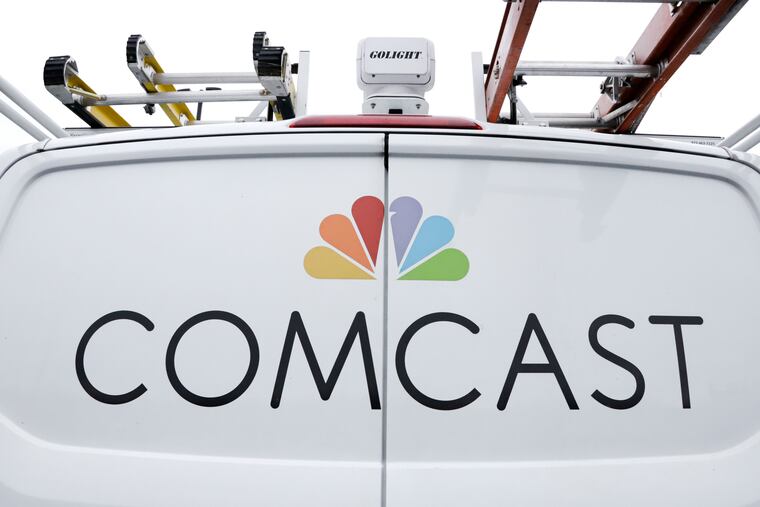Comcast trying to put Denver sports channel out of business, lawsuit alleges
Altitude claims Comcast is trying to “extinguish competition” so it can pocket more money from consumers who pay a monthly regional sports fee for TV service.

A Denver-based regional sports channel sued Comcast on Monday, claiming the cable giant is using its market power to drive the network out of business.
Altitude Sports and Entertainment, which airs Colorado Avalanche and Denver Nuggets games, has been unavailable to Comcast customers in the Denver region since August amid a dispute over how much Comcast pays to distribute the network.
The lawsuit comes as Comcast takes heat over its plans to drop Starz from premium packages amid a similar dispute that has drawn the attention of lawmakers, including a U.S. senator who asked the U.S. Department of Justice to ensure fair competition in the marketplace.
Philadelphia-based Comcast is the dominant television provider in the Denver area, controlling more than half of the region’s market share, according to the complaint. In addition, Comcast owns and distributes regional and national sports programming across the country through its subsidiary, NBCUniversal.
According to the complaint, Comcast has made demands in contract negotiations with Altitude that would drive the independent sports channel out of business, including drastic cuts in what Comcast would pay the network and moving Altitude to a more expensive TV package with fewer subscribers. Comcast has not made these demands on its own affiliated regional sports networks, the complaint says.
“We simply cannot operate at Comcast’s terms. Our costs would be higher than our revenues, and Comcast knows this because it owns and operates regional sports networks,” Matt Hutchings, Altitude’s president, said during a conference call with reporters. “Comcast has left us no option but to hold them accountable in federal court.”
Comcast called Altitude’s lawsuit “meritless” and said the sports channel has several distribution alternatives in an “intensely competitive market” where Comcast has no competitive regional sports networks. The company will “vigorously” defend itself against Altitude’s claims, Comcast spokesman John Demming said in a statement.
“Instead of pursuing baseless litigation, Altitude should engage in responsible commercial negotiations that would allow Comcast to distribute its programming to those customers who want it without driving up costs for customers who do not,” Demming said.
Altitude claims Comcast is trying to “extinguish competition” so it can pocket more money from consumers who pay a monthly regional sports fee for TV service. The suit further alleges that Comcast will either try to buy Altitude or set up its own regional sports network to replace Altitude if it succeeds in putting the channel out of business.
“The terms proposed by Comcast to Altitude make no economic sense unless Comcast’s aim is to use its monopsony power to eliminate Altitude so that Comcast will control sports programming — both regional and even some national coverage — in the Denver [market], just as Comcast has done elsewhere,” the complaint says.
Altitude recently reached a carriage agreement with DirecTV, which is owned by AT&T, but has not struck deals with Comcast or Dish Network. The simultaneous, months-long disputes have left many Denver sports fans unable to watch NHL and NBA games in their homes.
Colorado Gov. Jared Polis wrote a letter to Altitude last week urging the network to “complete a deal immediately.”
Broadcasters typically ask TV distributors such as Comcast to pay more to carry their TV channels, while distributors try to keep costs low to compete with cheaper online streaming options. The fee disputes have become more contentious in recent years as consumers get more options to access programming.
Last month, Comcast announced it will drop Starz from premium packages in December, replacing it with Epix, so customers with those packages will have to pay $12 more a month to keep Starz, which includes popular shows such as Outlander and Power.
The plan to dump Starz from its packages comes as Comcast battles the network over how much it pays to carry Starz content, with their current deal set to expire at the end of the year. Comcast wants to offer Starz as a direct-to-consumer subscription service instead of bundling it in a package.
U.S. Sen. Susan Collins (R., Maine) wrote a letter to Makan Delrahim, the assistant attorney general for the antitrust division, asking him to evaluate the situation and “take whatever action is appropriate to ensure full and fair competition in this marketplace.”
"These changes could lessen competition in the video programming market and limit choices for many thousands of consumers in Maine, and millions more across the nation,” she wrote in the September letter.
In Denver, Altitude says Comcast continued to charge consumers a regional sports fee even as it paid nothing to Altitude while the channel was blacked out. Only recently did Comcast issue “small monthly credits” to subscribers, the complaint says.
A redacted cable bill shared by Altitude shows Comcast gave a $1.25 credit to a customer who was charged $8 a month for a regional sports fee. Comcast notes that Altitude is not the only regional sports network in the market.
Altitude has asked a judge to declare Comcast in violation of federal and Colorado antitrust laws and order Comcast to distribute Altitude’s programming “on reasonable, non-discriminatory terms." The suit also seeks unspecified monetary damages.